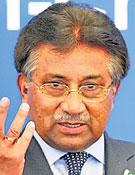
Political foes turn screw on strongman MusharrafISLAMABAD, Saturday (AP) - For eight years President Pervez Musharraf dominated Pakistan and charmed the West as a straight-talking ally in the war on terror. Now his political foes are in the driving seat and the former army chief is a beleaguered figure, under mounting pressure to resign. Yet he retains the support of U.S. President George W. Bush, and Musharraf seems in no mood to give way, even though the parties in the new civilian government are arrayed against him. In a significant shift this week, Asif Ali Zardari, the leader of the largest party in the coalition that took power after crushing the president's allies in February elections, explicitly called for Musharraf's resignation. He had earlier appeared willing to work with him.
''We believe Musharraf must go because the people of Pakistan no longer want him,'' said party spokesman Farhatullah Babar. ''It will be better and there will be less political acrimony if he resigns rather than waiting to be impeached.'' That aligns Zardari's Pakistan People's Party closer to the tough line of former premier Nawaz Sharif, whose party polled second in the elections and has been baying for Musharraf's political blood. ''It looks like Musharraf is under extreme pressure, and it's more and more difficult for him to continue,'' said Talat Masood, a retired general and prominent political commentator. ''The pressure is building up from every side.'' That includes Pakistan's freewheeling media which has reported aggressively on the clouds gathering around the president. The News, the biggest English-language newspaper, reported that Musharraf had ''made up his mind to call it a day'' after a late night meeting Wednesday with his successor as army chief Gen. Ashfaq Parvez Kayani. Musharraf denied that report Thursday and stressed that he had the ''best of associations'' with the army chief and gave as proof Kayani's invitation for dinner at his house this Sunday. Speaking at a banquet attended by top officials, including Kayani, Musharraf said he was a following a policy of ''conciliation, rather than that of confrontation'' and would support the civilian government. The intense focus on Musharraf's fate comes despite myriad problems facing Pakistan: controversial peace talks with Taliban militants; a gathering economic crisis; and a drawn-out dispute between Sharif and Zardari over how to restore judges axed by Musharraf. Musharraf still enjoys the backing of his top foreign ally, Bush, who delivered a clear endorsement of his staunch ally in the war on terror after they spoke by telephone on Friday. Bush ''reiterated the United States' strong support for Pakistan and he indicated he looks forward to President Musharraf's continuing role in further strengthening U.S.-Pakistani relations,'' White House press secretary Dana Perino said. That statement is likely to raise the hackles of opponents who accuse Washington of propping up the unpopular Pakistani president, who took power in a 1999 coup. The Nation newspaper said that by delaying his departure, Musharraf would ''only add to the number of his opponents and make them increasingly determined.'' |
|
||||||
|| Front
Page | News | Editorial | Columns | Sports | Plus | Financial
Times | International | Mirror | TV
Times | Funday
Times || |
| |
Reproduction of articles permitted when used without any alterations to contents and a link to the source page.
|
© Copyright
2008 | Wijeya
Newspapers Ltd.Colombo. Sri Lanka. All Rights Reserved. |
